Women have been fighting for equality and recognition for centuries, and literature has been one of the most powerful tools in their arsenal. Many authors have written about the struggles and triumphs of women, and their stories have inspired generations of readers. In this article, we will explore ten books about female strength that all women should read.

The Handmaid’s Tale” by Margaret Atwood
Set against the bleak backdrop of a dystopian future, Atwood’s narrative stands as a stark warning about the erosion of women’s rights. It’s not just fiction but a commentary on possible realities. Through its chilling story, the novel underscores the significance of autonomy, voice, and women’s resilience. Atwood crafts a world where these fundamental rights are snatched away, urging readers to recognize and cherish their freedoms.
“Lean In” by Sheryl Sandberg
Facebook’s COO, Sheryl Sandberg, does more than just recount workplace anecdotes. She provides a candid examination of the systemic challenges women encounter in the professional world. Her book is an empowering toolkit, championing women to assert their rightful place, shatter glass ceilings, and challenge the age-old patriarchal norms that permeate corporate culture.
“The Yellow Wallpaper” by Charlotte Perkins Gilman
Charlotte Perkins Gilman’s haunting short story masterfully intertwines themes of mental health, confinement, and societal expectations imposed on women. While set in a bygone era, its themes remain painfully relevant today. It serves as a potent reminder and critique of societal attitudes that constrain women’s physical and mental freedom, emphasizing the urgency of change.
“The Second Sex” by Simone de Beauvoir
Simone de Beauvoir’s seminal work is not merely academic discourse but a clarion call for gender equality. By weaving insights from history, biology, and psychoanalysis, de Beauvoir creates a comprehensive understanding of the deep-seated roots of women’s subjugation. It’s a revelation, a text that underscores the urgency of redefining societal structures and attitudes towards women.
“I Am Malala” by Malala Yousafzai
Malala’s memoir isn’t just about the bullet she took for education; it’s about her undying spirit that refused to be silenced. Detailing her audacious fight for girls’ education in Pakistan, the book resonates with courage, determination, and hope. Malala’s story stands as a beacon, urging every woman to find her voice against oppressive regimes and outdated norms.
“Bad Feminist” by Roxane Gay
Roxane Gay’s anthology is a refreshing, modern dive into the world of feminism, embracing its complexities and contradictions. She doesn’t claim to have all the answers but prompts readers to ask the right questions. By assessing culture, politics, and gender, Gay underscores the idea that imperfection doesn’t undermine advocacy for women’s rights but makes it more relatable and genuine.
“Becoming” by Michelle Obama
Michelle Obama’s memoir goes beyond her life as the First Lady, recounting her formative years, triumphs, and challenges. Her story, filled with wisdom and introspection, offers insights into navigating life’s hurdles as a woman of color. Through her eyes, readers experience the dynamics of race, gender, and politics, and the essence of empowerment in adversity.
“Their Eyes Were Watching God” by Zora Neale Hurston
Zora Neale Hurston’s evocative tale chronicles Janie Crawford’s journey of self-discovery in a society that often seeks to silence and subdue women. Through rich narrative and vivid characterization, Hurston explores love, identity, and societal constraints. The story, while set in the past, resonates with any woman seeking her voice amidst societal noise.
“The Bell Jar” by Sylvia Plath
Sylvia Plath’s semi-autobiographical novel is an intense exploration of a young woman’s psyche as she grapples with societal expectations and personal aspirations. It’s more than just a tale of descent into depression; it’s a reflection on the pressures that women, even today, face. Plath’s poignant prose encourages introspection on the balance between societal norms and individual fulfillment.
“Women Who Run With the Wolves” by Clarissa Pinkola Estés
Estés crafts a masterpiece that delves deep into the female psyche, using myths and stories to elucidate the archetype of the wild woman. This book isn’t just a read but an experience, emphasizing the sacred, primal connection between women and nature. It’s an invitation to every woman to rediscover and celebrate her innate wild, intuitive, and resilient nature.
